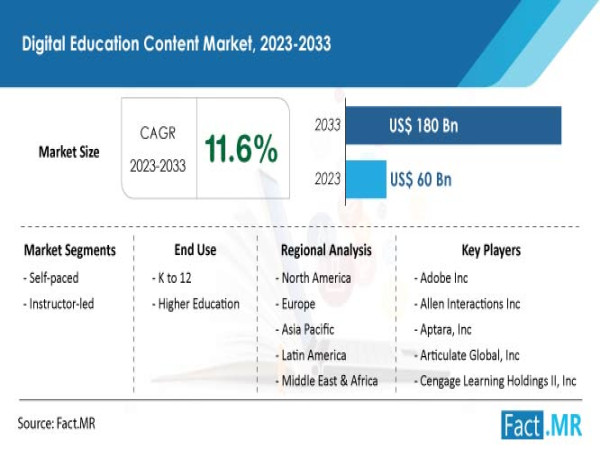Fact.MR reports that the rising demand for K to 12 online educational content is expected to drive growth in the worldwide digital education content market.
ROCKVILLE, MD, UNITED STATES, October 31, 2023 /EINPresswire.com/ -- In 2022, North America held a 47% share of the global market, with the United States playing a significant role in driving this regional market. Compared to the rest of the world, the United States is anticipated to take the lead in developing and implementing cutting-edge technologies, exerting a dominant influence on the broader landscape of digital education.The worldwide digital educational content market share is projected to experience significant growth with a robust CAGR of 11.6%, ultimately reaching a market worth of $180 billion by 2033, a substantial increase from the $60 billion valuation in 2023.
For more insights into the Market, Request a Sample of this Report: https://www.factmr.com/connectus/sample?flag=S&rep_id=8300
Education has transcended traditional boundaries of textbooks and classrooms, transforming into a fusion of technology, inventive pedagogy, and digital resources. The appeal of digital education has continuously expanded as technology has progressed, offering enhanced visual engagement, creative opportunities, and heightened learner satisfaction.
The Transformation of Education: Digital Learning in a Post-Pandemic World
Digital education, also known as Technology-Enhanced Learning (TEL), e-learning, or digital learning, represents the innovative utilization of contemporary technologies and digital tools to enhance the teaching and learning experience. This educational paradigm not only harnesses the power of technology but also embraces the future of learning by incorporating digital devices and gadgets. The advantages of digital education are multifaceted, encompassing reduced educational expenses and the delivery of specialized course content.
The global digital education content market experienced a significant boost in the wake of the COVID-19 pandemic. This unprecedented health crisis led to a surge in demand for online education, with individuals, businesses, and educational institutions increasingly relying on online learning to adapt to the challenges and disruptions it posed.
Furthermore, higher education institutions in the United States adopted digital education platforms to offer university-branded online learning as a cost-effective solution in the face of financial constraints and a growing student preference for hybrid learning. This transformative shift in education marks a new era in which technology plays a pivotal role in shaping the future of learning.
Augmented Reality Revolutionizing Digital Education Content
Augmented Reality (AR) is poised to revolutionize the digital education content market by enhancing the learning environment through the incorporation of sound effects, text, multimedia, and graphics. AR has gained significant traction in educational institutions worldwide, offering various benefits such as improved problem-solving skills, collaborative learning, an emphasis on technical proficiency, and better preparation for the future.
AR's ability to seamlessly integrate digital elements into the real world fosters greater interaction and engagement, allowing students to dedicate more time to their studies while cultivating empathy.
- An illustrative example of this transformation is the partnership between the Central Board of Secondary Education (CBSE) and Meta, a prominent online social media and networking service provider based in the United States. In July 2021, they introduced a curriculum in India that focuses on digital safety, augmented reality, and online security. This initiative aims to provide certified augmented reality programs for teachers and enhance digital safety and online well-being for students.
Key Companies Profiled
- Adobe Inc
- Articulate Global, Inc
- Allen Interactions Inc
- Aptara, Inc
- City & Guilds
- Cengage Learning Holdings II, Inc
- Discovery Education
The Proliferation of Internet-Connected Devices and Its Impacts
The widespread adoption of internet-connected devices has seen a remarkable surge, propelled by the continuous expansion of global technological infrastructure and transformative innovations. This phenomenon has given rise to a digital revolution, particularly in the field of education, which now outpaces many other industries. Thanks to this proliferation, individuals of all ages can access distance learning courses with ease, as long as they have smartphones and internet connectivity. This has allowed them to pursue their educational goals without the need to leave the comfort of their homes, workplaces, or localities.
Harnessing the boundless wealth of knowledge and information available on the internet, educational institutions worldwide are increasingly leveraging digital resources to provide certifications, courses, and degrees to both urban and rural populations. Furthermore, the advent of interactive teaching methods within online education has proven to be a valuable asset for both educators and students, contributing to the growing number of individuals opting for virtual classrooms.
In addition, cloud computing technology has played a pivotal role in assisting educational institutions in developing and enhancing digital library systems. A notable example is Adobe Systems' Creative Cloud Libraries, empowering universities to curate virtual libraries tailored to their specific curricula. Students can conveniently access these resources through their digital devices.
Moreover, the rapid expansion of high-speed internet infrastructure in emerging economies like China and India has led to these nations emulating the digital education models of more developed counterparts such as the United States and the United Kingdom. This paradigm shift is expected to drive the global demand for digital educational content in the foreseeable future.
The Increasing Significance of Data Analytics in Digital Education
In recent years, there has been a remarkable surge in the utilization of data analytics tools and technologies, such as Big Data, within the realm of digital educational publishing. Consequently, a multitude of providers have started integrating data analytics with their educational content offerings, empowering learners to gauge their engagement in various learning activities.
Take, for instance, Adobe Systems, which presents an Experience Cloud tailored for higher education institutions. Through the incorporation of content management tools, analytics, and automation technologies, this platform allows educational institutions to personalize students' campus experiences by fostering mobile engagement and fostering online communities.
- Simultaneously, the education sector is witnessing a growing demand for personalized individualized learning experiences. Consequently, the adoption of data analytics is poised for further expansion, driving forward the global market in this sector.
Get Customization on this Report for Specific Research Solutions:
https://www.factmr.com/connectus/sample?flag=RC&rep_id=8300
Competitive Environment
The demand for digital educational content is surging, attracting a diverse range of companies, from fledgling startups to well-established publicly traded corporations. This market garners considerable attention not only from seasoned industry experts but also from general investors, especially in two prominent categories: K to 12 and higher education. Each of these sectors exhibits unique funding channels, end-users, and buyer dynamics.
Prominent players in the digital education content sector are engaged in a variety of strategic initiatives, such as collaborations, acquisitions, mergers, and partnerships with other influential market participants.
- In December 2021, Udemy entered into a strategic collaboration with MultiChoice, Africa's foremost entertainment provider. This collaboration aimed to grant users access to a wide array of top-quality online learning opportunities, making high-quality courses available in numerous languages for MultiChoice customers.
- In October 2021, edX forged a partnership with Meta, previously known as Facebook, with the objective of fostering the training of the next generation of content creators, developing immersive educational materials, and expanding access to learning within the metaverse.
- In January 2021, Pluralsight acquired Next Tech, a provider of cloud-based computing environments. This strategic move allowed Pluralsight to enhance its technological skills platform for customers by seamlessly integrating hands-on experiences into their existing educational content.
Check out more related studies published by Fact.MR Research:
Augmented Reality (AR) in Education Market: According to a detailed industry analysis by Fact.MR, the global augmented reality (AR) in education market is expected to rise at a stupendous CAGR of 32% and hit a valuation of US$ 55.84 billion by 2033, up from US$ 3.47 billion in 2023.
Digital Transformation Market: The demand for digital transformation is expected to reach US$ 2.3 Trillion in 2032, exhibiting a growth rate of 14.2%. The Y-o-Y for 2021-2022 is estimated at 19.1%.
About Us:
We are a trusted research partner of 80% of fortune 1000 companies across the globe. We are consistently growing in the field of market research with more than 1000 reports published every year. The dedicated team of 400-plus analysts and consultants is committed to achieving the utmost level of our client’s satisfaction.
Contact:
US Sales Office:
11140 Rockville Pike
Suite 400
Rockville, MD 20852
United States
Tel: +1 (628) 251-1583
Sales Team : [email protected]
Follow Us: LinkedIn | Twitter | Blog
S. N. Jha
Fact.MR
+1 628-251-1583
email us here






